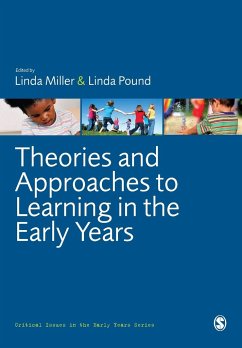By focusing on key figures in early years education and care, this book considers the influential thinkers and ground-breaking approaches that have revolutionized practice. With contributions from leading authorities in the field, chapters provide an explanation of the approach, an analysis of the theoretical background, case studies, questions and discussion points to facilitate critical thinking.
Included are chapters on:
- Froebel
- Psychoanalytical theories
- Maria Montessori
- Steiner Waldorf education
- High/Scope
- Post-modern and post-structuralist perspectives
- Forest Schools
- Vivian Gussin Paley
- Te Whatilderiki
Written in an accessible style and relevant to all levels of early years courses, the book has staggered levels of Further Reading that encourage reflection and promotes progression.
Linda Miller is Professor Emeritus of Early Years, The Open University
Linda Pound is a consultant and author, renowned for her work in early years education and care.
Included are chapters on:
- Froebel
- Psychoanalytical theories
- Maria Montessori
- Steiner Waldorf education
- High/Scope
- Post-modern and post-structuralist perspectives
- Forest Schools
- Vivian Gussin Paley
- Te Whatilderiki
Written in an accessible style and relevant to all levels of early years courses, the book has staggered levels of Further Reading that encourage reflection and promotes progression.
Linda Miller is Professor Emeritus of Early Years, The Open University
Linda Pound is a consultant and author, renowned for her work in early years education and care.
'This admirable book covers key historical and contemporary theories which underlie different approaches to Early Childhood Education and Care (ECEC). The authors have devised an excellent format which locates approaches to practice in a clear theoretical framework and also invites practitioners to engage in critical reflection, to develop their own distinct practices. This is a much needed strategy in a field where practitioners have often lacked the critical edge which could put them in the driving seat of their own practice. Thus, the inclusion of critique at the end of every chapter allows the reader to take a measured look at the often persuasive but subtly different approaches that ECEC has advocated' -
Journal of Early Childhood Research
'Critical thinkers, concerned with influencing critical issues, such as so-called 'schoolification' and 'school-readiness' will appreciate in this book the pivotal positioning of learning through play. In the final chapter the editors reiterate the importance of play in theories of early childhood learning and challenge current political trends towards the 'schoolification' of learning in the early years' -
ESCalate
As today's graduates become the leadership and management of tomorrow's world of Early Childhood Education and Care (ECEC) they are well advised to proceed to the book store for their own copy of 'Theories and Approaches to Learning in the Early Years'.
'Some very complex theories are presented in a refreshingly accessible and highly reader friendly way in this fairly academic text...The discussion points in each chapter are particularly helpful in supporting and facilitating critical thinking, whether you are starting out in early education studies, or keeping up-to-date with the latest thinking' -
Early Years Educator
'This is a well-organised and timely overview of the 'big picture' in Early Childhood Education and Care theory and practice, written by champions in their fields, highly accessible and offering real food for thought in beginning to inter-connect the complexities of ECEC. An excellent introductory text ' -
Pat Broadhead,
Professor of Playful Learning and Leeds Metropolitan University and Chair of TACTYC
'The authors are to be congratulated on presenting complex theories in a highly accessible form. Early childhood students and practitioners will find this an invaluable introduction to the wide range of theories underpinning research and practice in the field' -
Sue Rogers, Head of Department Learning, Curriculum and Communication,
Faculty of Children and Learning, Institute of Education
Sue Rogers, Head of Department Learning, Curriculum and Communication, Faculty of Children and Learning, Institute of Education
Journal of Early Childhood Research
'Critical thinkers, concerned with influencing critical issues, such as so-called 'schoolification' and 'school-readiness' will appreciate in this book the pivotal positioning of learning through play. In the final chapter the editors reiterate the importance of play in theories of early childhood learning and challenge current political trends towards the 'schoolification' of learning in the early years' -
ESCalate
As today's graduates become the leadership and management of tomorrow's world of Early Childhood Education and Care (ECEC) they are well advised to proceed to the book store for their own copy of 'Theories and Approaches to Learning in the Early Years'.
'Some very complex theories are presented in a refreshingly accessible and highly reader friendly way in this fairly academic text...The discussion points in each chapter are particularly helpful in supporting and facilitating critical thinking, whether you are starting out in early education studies, or keeping up-to-date with the latest thinking' -
Early Years Educator
'This is a well-organised and timely overview of the 'big picture' in Early Childhood Education and Care theory and practice, written by champions in their fields, highly accessible and offering real food for thought in beginning to inter-connect the complexities of ECEC. An excellent introductory text ' -
Pat Broadhead,
Professor of Playful Learning and Leeds Metropolitan University and Chair of TACTYC
'The authors are to be congratulated on presenting complex theories in a highly accessible form. Early childhood students and practitioners will find this an invaluable introduction to the wide range of theories underpinning research and practice in the field' -
Sue Rogers, Head of Department Learning, Curriculum and Communication,
Faculty of Children and Learning, Institute of Education
Sue Rogers, Head of Department Learning, Curriculum and Communication, Faculty of Children and Learning, Institute of Education

